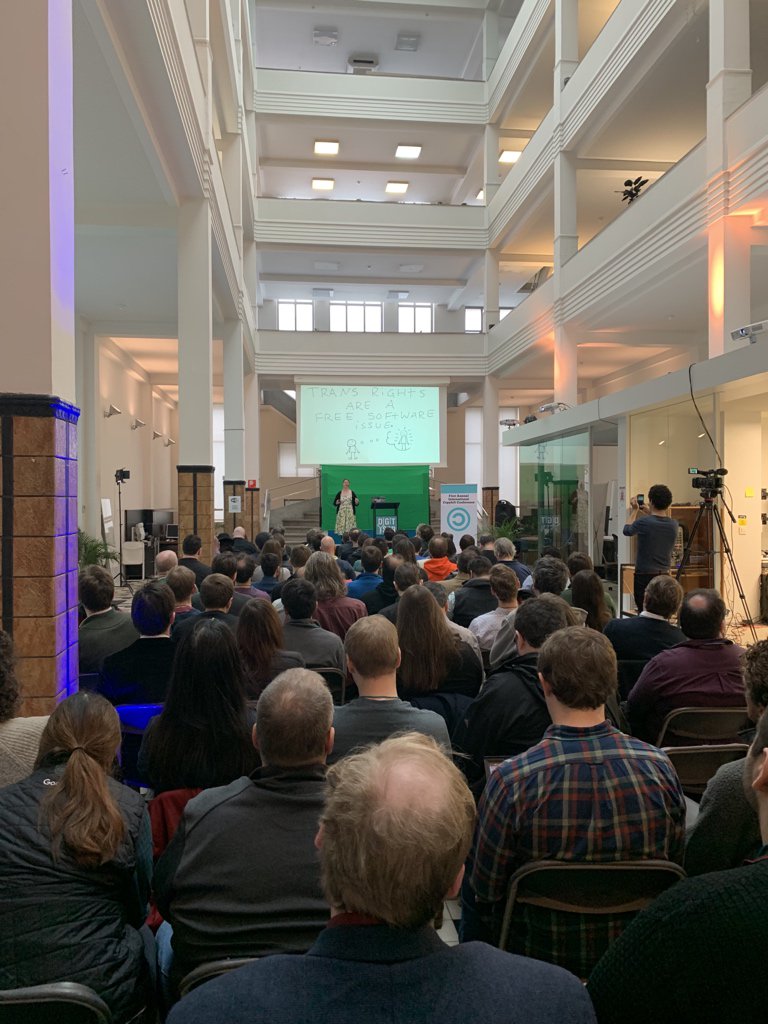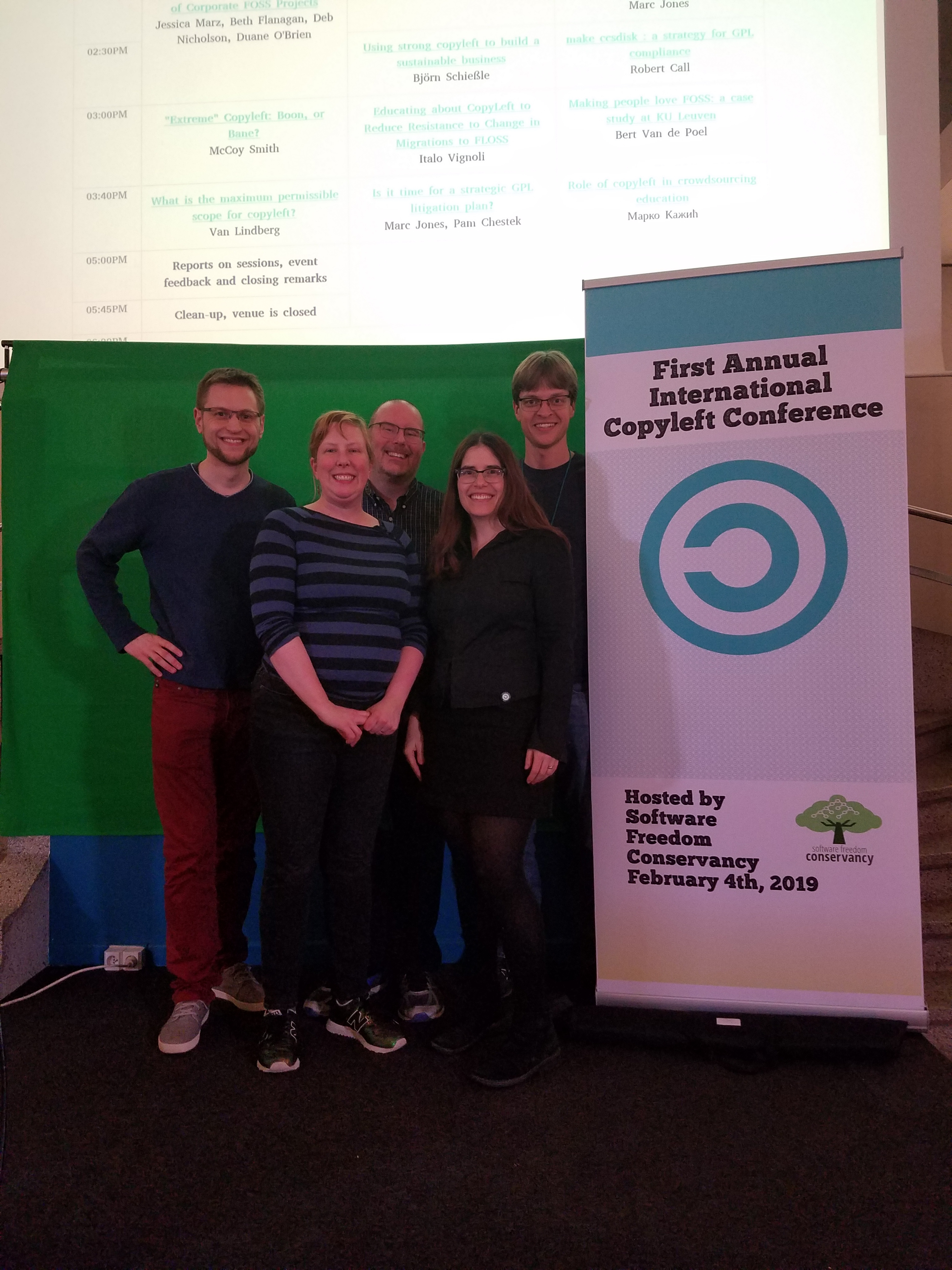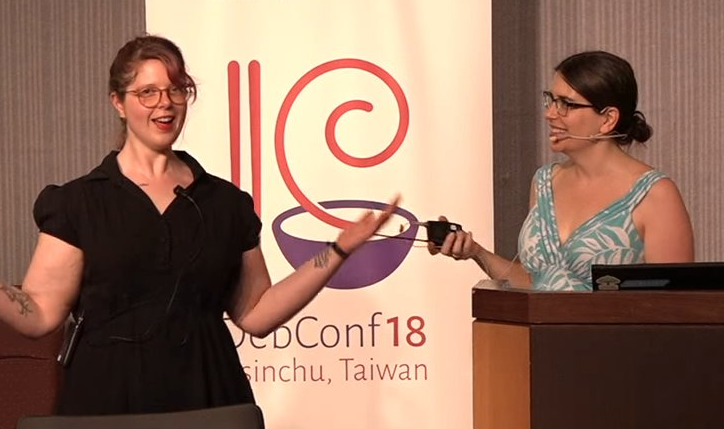![[RSS]](/static/img/feed-icon-14x14.2168a573d0d4.png) Conservancy Blog
Conservancy Blog
Join Conservancy at SCALE!
by on March 4, 2019
Next weekend, our President and Distinguished Technologist, Bradley Kuhn, will be in Pasadena for the seventeenth annual edition of the Southern California Linux Expo aka SCALE. SCALE is a community-run conference that starts on Thursday. March 7th and concludes on Sunday, March 10th.
On Sunday afternoon, Bradley will give a talk titled, "If Open Source Isn't Sustainable, Maybe Software Freedom Is?" a forward-looking talk on the future of free software.
Bradley will also run a workshop as part of the Embedded Apprentice Linux Engineer program, aka E-ALE series. "We cover introductory material for people new to the problem space. We're concentrating on userspace drivers this year in order to show people how you can, in fact, drive hardware without having to write kernel code." says Behan Webster, who co-founded aka E-ALE, with Tom King and John Hawley. The workshop is titled, "Navigate Licensing to Build Embedded Linux Apps" and will provide a good foundation for developers who are interested in learnng more about licensing their embedded apps.
Conservancy will also have booth #731 at SCALE during the following times -- swing by and say hello!
- Saturday, March 9, 2019 - 10:00 to 18:00
- Sunday, March 10, 2019 - 10:00 to 14:00
We could really use some volunteers to help us to greet folks, talk about our work and catch up with our supporters. If you can help with the booth please email us -- we'd really appreciate it!
Successful First Copyleft Conf!
by on February 22, 2019
Last year, in FOSDEM's Legal & Policy Devroom , we promised to hold an event co-located with the 2019 FOSDEM to have more in depth discussion around the legal issues that we care about as a community and in particular, copyleft. We made good on that promise and this year the first annual Copyleft Conf took place on February 4th. About 150 people came to the event from copyleft enthusiasts to the "copyleft curious." The venue, DigitYser was funky and accessible and walking distance from many downtown Brussels hotels.

By all accounts, it was a very successful first event. We had 25 speakers, panelists and discussion leaders -- including lawyers, coders, academics, non-profit employees and industry folks. The audience was extremely engaged, participating in discussions and asking great questions.
The Right Time
Here at Conservancy, we've wanted GPL compliance and copyleft licensing to be de-mystified and approachable for a long time. We also wanted to provide a place to talk about the future of copyleft; where else it might impactfully be applied, how it might evolve as technology changes and how it could best serve the next generation of users and developers. Additionally, we needed it to be a friendly, welcoming space where new folks and more experienced folks could begin to bridge some gaps.
Our Most Sincere Thanks
Thanks so much to our program committee, our onsite volunteers and everyone who helped us spread the word about the event. We want to especially thank our friends from the FOSDEM video team, who joined us the day after FOSDEM (which is already a massive gift to the free software community!) and spent the day live-streaming and recording all our sessions. Thank you as well to the lovely folks at DigitYser who went above and beyond to assist the video team and promote our event to the local Belgian community.

Copyleft Conf would've been nothing without our speakers and discussion leaders, or our inspiring keynote Molly deBlanc, who set a high-minded and altruistic goal for the day's discussions. We are also very grateful to our sponsors and of course, all our lovely attendees who took a chance and came out for an inaugural event.
What's Next?
We're so glad you asked! First of all, make sure you stay in touch by joining our low-traffic mailing list. Also, stay tuned, because video is coming. We will let you know when it's all up and we hope you'll share the sessions you liked with friends and colleagues. And finally, please let us know if you have thoughts for making Copyleft Conf better next time, via email. We'd love to hear from you.
Both images are licensed CC.BY.SA, the picture of Molly deBlanc was taken by Leslie Hawthorn and the staff picture by Deb Nicholson (with help.)
Volunteers needed in Brussels! Also, January is Busy.
by on January 25, 2019
Hello again, friends! January at Conservancy is a very busy month -- we launch an Outreachy round, close our financial year, finish up our year-end fundraising and then? Well, then we get ready to go out and talk to folks about software freedom and events like linux.conf.au and FOSDEM. In fact our Executive Director, Karen Sandler's talk on "Right Not to Broadcast" and our Distinguished Technologist, Bradley Kuhn's talk on "Preventing the IOT Dystopia with Copyleft" are both already up.
And, oh boy, are we at FOSDEM this year.
We could really use your help in several key areas:
- Helping us set up for video at Copyleft Conf on Sunday, February 3rd after FOSDEM in the evening
- Midday booth help on either Saturday or Sunday
- Saturday morning help bringing stuff to FOSDEM
- General conference staff support or video support on Monday the 4th at Copyleft Conf
If you are able to help out with any of these tasks, please drop us a note so we can schedule you. We will be eternally grateful for any slice of time you can offer. Small orgs like Conservancy depend on our supporters to pitch in -- thank you so much!
Thanks for Helping Us Meet Our Fundraising Challenge!
by on January 15, 2019
We're really excited to head into 2019 with our fundraising goals met. Thank you everyone (and their cats!) for sharing stories about our work these last two months. We really do rely on our supporters to tell their free software loving friends and colleagues about Conservancy. Thank you especially to Private Internet Access has supported our fundraising efforts with a $50K match -- they are true Conservancy champions! Thanks also to Molly de Blanc: Free Software Superstar, for organizing our biggest year-end match ever by bringing in more individual matchers than we've ever had.
 Molly was joined by Elana Hashman, Sage Weil, Josh Triplett, Matthew Garrett, Keith Packard, Martin Krafft, one anonymous donor and our pals at Private Internet Access.
Molly was joined by Elana Hashman, Sage Weil, Josh Triplett, Matthew Garrett, Keith Packard, Martin Krafft, one anonymous donor and our pals at Private Internet Access.
Thanks also to Purism and other stalwart friends like VM Brasseur who helped us by telling everyone they know that you should be donating to Conservancy. We are also honored that free software luminaries like; Katie McLaughlin, Leslie Hawthorn, Kade Crockford and Jeremiah Foster were willing to eloquently tell people why Conservancy's work is important to them.
Are you coming across this post after the fact? You can donate to Conservancy all year round, (it just won't be doubled) and we'll still use it to support a diverse, community-driven free software future. Thanks!
Next page (older) » « Previous page (newer)
1 2 3 4 5 6 7 8 9 10 11 12 13 14 15 16 17 18 19 20 21 22 23 24 25 26 27 28 29 30 [31] 32 33 34 35 36 37 38 39 40 41 42 43 44 45 46 47 48 49 50 51 52 53 54 55 56 57 58 59 60 61 62 63 64 65 66 67 68
